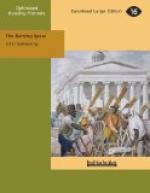“Certainly, sir. Good-night, sir.”
“Good-night, Joe. Shake hands.”
When Joe was gone, accompanied by the unwilling Blink, turning her beautiful dark eyes back to the last, Mr. Lavender sat down at his bureau, and drawing a sheet of paper to him, wrote at the top of it.
“My last Will and Testament.”
It was a long time before he got further, and then entirely omitted to leave anything in it, completely preoccupied by the preamble, which gradually ran as follows:
“I, John Lavender, make known to all men by these presents that the act which I contemplate is symbolical, and must in no sense be taken as implying either weariness of life or that surrender to misfortune which is unbecoming to an English public gentleman.” (Over this description of himself Mr. Lavender was obliged to pause some time hovering between the two designations, and finally combining them as the only way out of his difficulty.) “Long and painful experience has convinced me that only by retiring from the former can I retain the latter character, and only by retiring from both can I point the moral ever demanded by my countrymen. Conscious, indeed, that a mere act of private resignation would have no significance to the body politic, nor any deflecting influence on the national life, I have chosen rather to disappear in blue flame, so that every Englishman may take to heart my lesson, and learn from my strange fate how to be himself uninfluenced by the verbiage of others. At the same time, with the utmost generosity, I wish to acknowledge in full my debt towards all those great writers and speakers on the war who have exercised so intoxicating an influence on my mind.” (Here followed an alphabetical list of names beginning with B and ending with S.)
“I wish to be dissociated firmly from the views of my chauffeur Joe Petty, and to go to my last account with an emphatic assertion that my failure to become a perfect public gentleman is due to private idiosyncrasies rather than to any conviction that it is impossible, or to anything but admiration of the great men I have mentioned. If anybody should wish to paint me after I am dead, I desire that I may be represented with my face turned towards the Dawn; for it is at that moment so symptomatic of a deep adoration—which I would scorn to make the common property of gossiping tongues—that I intend to depart. If there should be anything left of me—which is less than probable considering the inflammatory character of the material I design for my pyre—I would be obliged if, without giving anybody any trouble, it could be buried in my garden, with the usual Hampstead tablet.
“’JohnLavender,
the public man, who
died for his
country’s good, lived
here.’




